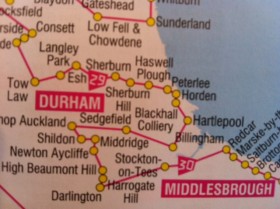Follow the brown signs



The Brown Sign Torch Relay Day 30: Michael Caine and the slag
 So it’s day 30 and we’re jogging with our imaginary Olympic torches on a big backwards “S” route from Durham down to Middlesbrough today. Looking at the map Blackhall Colliery caught my eye and became, for reasons explained below, my destination of the day.
So it’s day 30 and we’re jogging with our imaginary Olympic torches on a big backwards “S” route from Durham down to Middlesbrough today. Looking at the map Blackhall Colliery caught my eye and became, for reasons explained below, my destination of the day.
Whenever I go to places that have a significant industrial history I find myself getting totally beguiled by them. Industrial heritage sites aren’t the kinds of places you’d expect to be beguiled by, they’re not exactly romantic and are usually bridges, massive machines, mines, factories and the like. But I’m interested in them more for what they stand for than the actual things themselves (although I’ve mentioned before on the blog that big dams and bridges give me the absolute screaming willies which I both love and hate in equal measure), they tell us a very important story about the beginning of our modern world, something that’s all too easy to forget or ignore.
Life during the making of modern Britain was hard, smelly, probably quite exciting and a lot unsettling. The huge advances we made as a nation began with the great industrialists of the Industrial Revolution around 300 years ago, who have shaped the way we live and it’s thanks to them that we live in a country that (on the whole) is no longer so hard and smelly (although it is still exciting and unsettling, life is not life without these). The people who had big ideas and wanted to push forward to do things that hadn’t been done before are the people who made happen all the things we have now that we take so much for granted. Suddenly manufacturing could be done on a massive scale and instead of relying on man power, forward thinkers (who also wanted to forward their profits) were finding ways to mechanise processes, speed everything up and get as many people as possible to buy their products and use their services. Production was increased beyond anything thought possible which in turn gave Brits more jobs and money than they ever had before.
These beginnings of our modern world fascinates me, so even if the sound of visiting a place called “Blackhall Colliery” may not seem appealing to you, to me it spells yet more industrial heritage to uncover and get excited by, and a town that is quite literally named after a coal mine, well frankly that makes me go a bit weak at the knees.
The Durham Mining Museum website tells the story of Blackhall Colliery and the many other mines that lay along the north east coast which used to provide the jobs and prospects for the thousands of miners and their families who lived and worked here from the early 19th century. But as is the case with so many British coal mines, production at the collieries was halted when mining was deemed not profitable enough to continue and a whole industry that once fuelled the whole British industry died. Blackhall Colliery finally closed in the early ’80s and after years of dumping millions of tonnes of slag over the nearby coastline the area was an abandoned black mess of forgotten industrial waste. Prospects for the area looked bleak.
The beach at Blackhall Colliery provided the appropriately creepy and spectacularly depressing backdrop for the famous “revenge” scene of the classic 1971 film Get Carter. The almost unbelievable scale of waste dumping from the mine into the sea, just a few hundred yards away, is grotesquely highlighted in the film, and to remind you (and inspire you to dig out your VCR and watch the video I know you own later) it is below…
The joy of this ruined beach and it’s chockingly awful surroundings though lies in what it eventually inspired. In recent years there has been a huge push to clean up the whole area. A £10 million project called Turning the Tides helped get the old mine works, industrial waste, scary conveyor and massive concrete tower completely removed from the coastline and the beach was totally cleaned up. The project won (along with The Eden Project) the Outstanding Achievement in Regeneration in the annual Royal Institute of Chartered Surveyors awards in 2002 and the beach now sits on the Keep Britain Tidy Blue Flag Beach Scheme among the cleanest in Britain. Quite a impressive turnaround, don’t you think? God I love hard work and dedication to a cause like this…
So today is all about Britain’s industrial past and the legacy it has left us, the good and the bad. But even when that legacy isn’t a pleasant one this world and the people who live on it are always adapting and changing, I love the fluidity and the constantly adding of chapters to our history. So here’s to the beginnings of our industrial past and the beginnings of our greener future.






